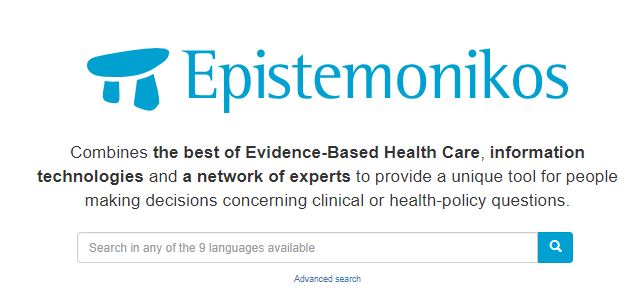Evidence from scientific research can help to inform healthcare decisions. Some evidence is more trustworthy than others, and systematic revisions, when well conducted and updated, are considered the best evidence there is for answering questions that compare two or more treatment alternatives. Lately, there has been a fast increase in the amount of systematic revisions available, so decision-makers must choose among the various options. The Epistemonikos database is a highly efficient search resource, since it assembles a large number of systematic revisions and allows access to the body of evidence for a specific question in a simple and intuitive way. In addition, it offers tools that allow to choose between different systematic revisions and to keep evidence on a specific subject easily updated.
A technical cooperation agreement between the Epistemonikos Association and the Pan American Health Organization (PAHO/WHO) allowed the integration of the Epistemonikos database to the Virtual Health Library (VHL) of the Latin American and Caribbean Center for Health Sciences Information (BIREME). The objective of this integration is to enrich existing VHL records through the application of the Epistemonikos program interface. Furthermore, the agreement aims to strengthen the technical capacity of evidence use by health decision-makers in the Region; the strengthening of adequate translation of health decision-makers’ knowledge in Latin America and the Caribbean; the development of methodologies to improve the translation of knowledge in order to generate new useful knowledge in Latin America and the Caribbean; the dissemination of software and services created by Epistemonikos and that are considered by BIREME as useful for users; and the strengthening of existing networks such as EVIPNet, in order to promote exchanges among health decision-makers in the Region and support the dissemination of results.
 To illustrate the result obtained by users, if the retrieved document is a primary study, users will have the opportunity to access all systematic revisions that include it and are available in Epistemonikos. Inversely, if the document is a systematic revision, users will have access to the primary studies available in Epistemonikos, as long as the identification of the systematic revision has been performed by a human and not by machine learning.
To illustrate the result obtained by users, if the retrieved document is a primary study, users will have the opportunity to access all systematic revisions that include it and are available in Epistemonikos. Inversely, if the document is a systematic revision, users will have access to the primary studies available in Epistemonikos, as long as the identification of the systematic revision has been performed by a human and not by machine learning.
See the examples below:
Renato Murasaki (BIREME/PAHO/WHO Methodologies and Information Technologies Manager) explains that this integration happens online, which means that for each entry visualized in the Regional VHL, a requisition is launched to the Epistemonikos webservice to find out if there is any additional information that can be displayed in the VHL.
This result is fruit of an agreement signed by Gabriel Rada, representing Epistemonikos, and the PAHO/WHO Director, Dr. Carissa Etienne, who designated Ludovic Reveiz (PAHO/EIH/HA) and Renato Murasaki (BIREME MIT/AFI Manager) as her representatives.
According to Ludovic Reveiz, PAHO/WHO Regional Advisor in Public Health Evidence, “having access to all this scientific evidence in one portal is an important achievement for the Region. The integration of Epistemonikos and the Virtual Health Library will facilitate the retrieval, access, and use of relevant scientific evidence to support health decisions. This is possible since Epistemonikos has constituted itself as a database that collects the largest number of systematic reviews worldwide and incorporated artificial intelligence technologies in order to facilitate access to information. In the same way, the Regional Portal of the VHL is formed by many information sources, including MEDLINE, LILACS, and bibliographic databases produced by the VHL Network, among others, all integrated and accessible thanks to BIREME’s technological advances”.
“At Epistemonikos”, states Gabriel Rada, President of the Epistemonikos Foundation, “our main mission is to approximate evidence to the people making healthcare decisions. The integration to the Virtual Health Library is a great step forward in this sense. We believe this alliance is an example of how the medical evidence ecosystem is enriched daily, thanks to the goodwill and the human and technical capacities of both teams. We are proud of the results achieved, and we trust that this new first cycle of integration will be of great help to researchers and will potentiate the application of evidence-based medicine in the Region.”
Murasaki emphasizes the participation of BIREME collaborator Vinicius Andrade (System Development/MTI) in the project, as well as the support given by the Information Technology Infrastructure team of the Administrative Management (ITI/AM) in the updating of the production environment for the Regional VHL search interface.